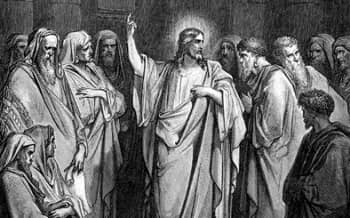 Gospel for 16 March 2020
Gospel for 16 March 2020
Monday of the Third Week of Lent
Luke 4:24-30
No prophet is ever accepted in his own country
Jesus came to Nazara and spoke to the people in the synagogue: ‘I tell you solemnly, no prophet is ever accepted in his own country.
‘There were many widows in Israel, I can assure you, in Elijah’s day, when heaven remained shut for three years and six months and a great famine raged throughout the land, but Elijah was not sent to any one of these: he was sent to a widow at Zarephath, a Sidonian town. And in the prophet Elisha’s time there were many lepers in Israel, but none of these was cured, except the Syrian, Naaman.’
When they heard this everyone in the synagogue was enraged. They sprang to their feet and hustled him out of the town; and they took him up to the brow of the hill their town was built on, intending to throw him down the cliff, but he slipped through the crowd and walked away.
Reflexion
Having earned his townspeople’s admiration with His charismatic persona, our Lord in today’s gospel passage delivers what seems to be a below-the-belt insult. Why is this insult so painful? Everyone wants to take credit for the celebrity they knew - “he’s my neighbour! We grew up together!” “We went to the same school together.” “We were as thick as thieves.” It’s called instant celebrity status by association. It’s so easy to take credit for someone else’s fame or achievements simply by claiming that you know him.
But here, our Lord chooses not to make that association. He would later stress that even the most intimate family relationship will not give you any extra advantage but rather what matters is one’s readiness to respond to the will of God.
And so he cites two examples of foreigners, pagans, non-Jews, considered outside of God’s chosen fold, as examples of God’s Providence. They received blessings not because of their identity or race or privileged position, but because both these exemplary models responded faithfully, humbly and obediently to God’s instructions given through His prophets. Something the ancestors of the Jews could hardly boast of.
By sidestepping His own people, who thought highly of themselves as being God’s chosen, these foreign examples illustrate the utter unconventionality and freedom of God’s plan of salvation. Our Lord wishes to challenge his audience and us to rethink the parameters within which God works. God is indeed a God of Surprises. He often works outside our familiar categories and beyond the parameters of what we would normally expect.
It often takes a tragedy to remind us how the walls that separate us are often permeable and that we are connected to each other in more ways than we can imagine. Tragedy, calamity, disease, a pandemic, death are no respecters of age, nationality, gender or creed. They remind us of what we have in common - our fragility as human beings, our need for solidarity in times of difficulty and our inability to dictate the outcome of an uncertain future. This is where we also see the God of Surprises working. He comforts the desolate, strengthens the weak, consoles the alienated and pours the balm of His grace on wounded hearts and bodies. If our brother or sister suffers, they do not suffer alone because we know that our God has done the unthinkable - He has suffered and died for us, and not just for us Christians but for “the many,” who are also His creatures and beloved children.
As we continue to labour under the painful and difficult fast from Eucharistic communion, the suspension of our treasured Masses, the denial of the physical company of friends and fellow parishioners, let us not just think of ourselves and what we have been denied of. It’s time to think beyond the parameters of our visible little world - to remember those who now suffer from this pandemic in one way or another and those brave men and women who have sacrificed so much to stay vigilant in the front lines to battle this disease and save lives.
Finally, let us not just be ambitious to share the limelight, the glory, the achievement and fame of the other, but let us be ready to share and bear the heavy burden which so many now carry alone, as how our Lord Jesus Christ carried the cross for our sake.
